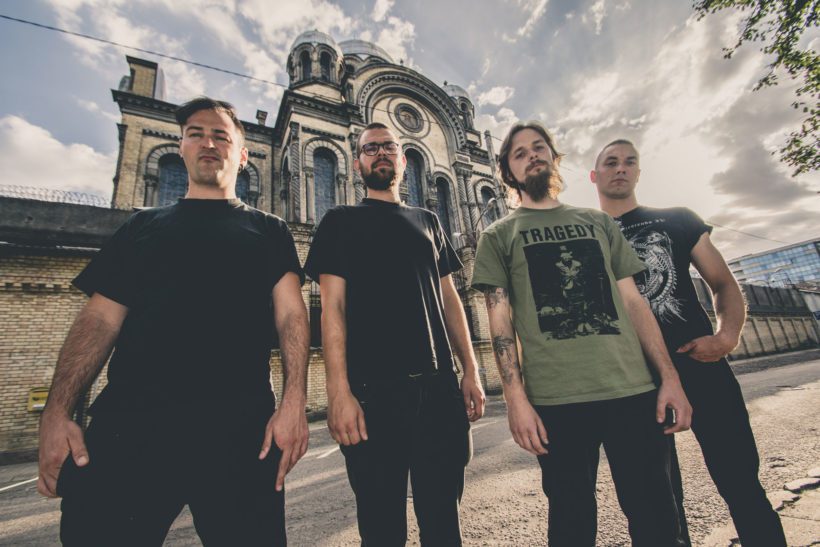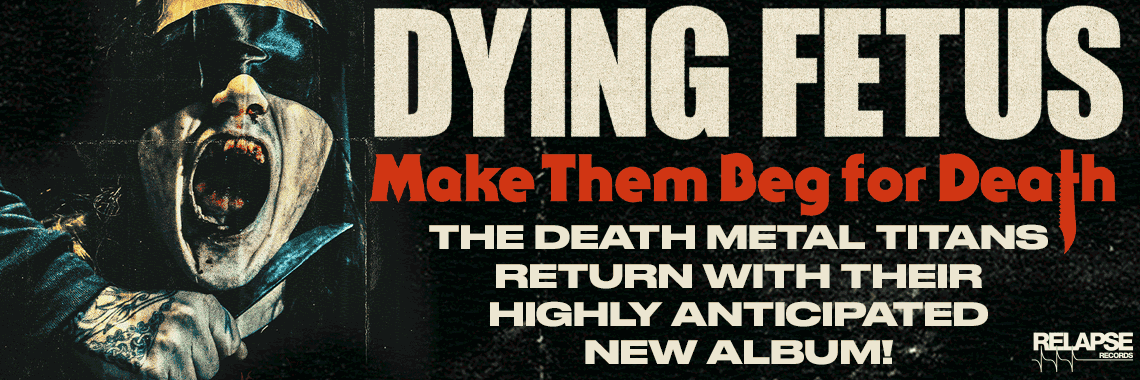
Lithuania noisemakers Erdve may be inspired by the likes of ISIS, Botch, and Swans, but they’re also informed by their environment. This deadly combination of dissonance, repetition, and cultural awareness makes for incredibly unnerving music. To wit, Erdve’s debut album, Vaitojimas (Season of Mist). From the moment the title track kicks off through mid-album bruiser “Apvertkis” to the final song “Atraja,” Vaitojimas reflects a disturbing journey.
Self-described as “heavy-atmospheric sound aesthetic based on raw expression,” Erdve’s approach to sound and structure is something to behold. At once, it recalls the early aughts when hardcore had extinguished its small-mindedness, expanding outward to pull in other influences, other trains of thought. But Erdve are also contemporary. They mirror the times, turbulent, uncertain, and overcast. Vaitojimas ultimate begs the question: what makes you happy? But it does so through filters opaque.
Decibel nabbed two-fourths of Erdve, namely Vaidotas (guitar/vocals) and Kristijonas (bass), to talk through the unbelievable heaviness–physically and metaphorical–on Vaitojimas. They’re all about reaching happiness, touching pain.
Let’s get some translation questions out of the way first. Erdve is Lithuanian for ‘Space,’ correct? And Vaitojimas is Lithuanian for ‘Shout?’ Tell us a little bit about how the band name and album title came to be, understanding the band name obviously came first.
Vaidotas: Thank you for speaking with us. As for translations, we have tried our best to communicate everything like it’s supposed to be, yet we do notice quite a lot of Google Translated meanings and misinterpretations.
Kristijonas: To be precise the word ‘Erdve’ means ‘of space’ or ‘of a boundless extent,’ as there is a peculiarity in the Lithuanian language called a “instrumental grammatical case” where a noun reflects a function performed by that phrase, so here ‘space’ is being is used as a tool or a function.
Vaidotas: ‘Vaitojimas,’ in our case means, ‘moaning.’ It’s that kind of moaning that you can hear often in mental institutions, mostly gibberish sounds made by patients. The album title came to mind after seeing a shocking documentary called Bulgarian Abandoned Children, the very first few seconds are exactly that. Look it up if you haven‘t seen it.
Do you feel that Erdve is the product of your environment, as Lithuanians? Musically, emotionally, conceptually…
Vaidotas: It most certainly is. We wrote the record for the sole purpose of making music, as we continuously did for the last 10 years, without any expectations, nor a very ambitious goal to have the record released properly. It’s just something we did while coping in between many different aspects in our personal lives. We do believe, that the locality and the cultural environment is what shapes your attitude and things that you perceive to be important. That way, your creative result becomes not only a personal effort, but a cultural one as well. These days it’s pretty common to follow someone else’s footsteps, by replicating their work and ways that things are done, but it’s also easy to lose your identity while pursuing that. I guess, we embrace that environment in order to remain honest with our art.
When you hear the word, ‘Erdve,’ what comes to your mind? Outer space, inner space, the space between spaces?
Kristijonas: Once we had a discussion about it and we came up with an interpretation of a sapien’s existence here. I think subconsciously it led us to the band name Erdve, where the idea was just a natural description about what is happening around us: There is a human being and his mind, soul and body, where he is just a cultural actor in the physical environment where he exists. So, basically it is about a complex relation of both, human action and his natural surroundings.
Who are some of the primary musical inputs to Erdve’s music? I hear elements of Breach, Tragedy, ISIS, and early Godflesh.
Vaidotas: Playing music and being a fan for quite many years, you discover many creative entities that you admire and take things from each that you consider to be valuable. Through such a filter, in time, you find certain values and aspects in all kinds of music or art in general. Our music and artistic approach is a result of those things that we chose to appreciate and to identify ourselves with. So it happens, that our music is more closely related to hardcore and extreme metal since those genres have influenced and shaped our understanding of what we consider to be heavy music. Certainly, we all share a common approach for unconventional side of things. We were greatly inspired by various artistic communities throughout the years and some of the key artists coming from Hydra Head, Neurot, Denovali Records, etc. with bands like Neurosis, ISIS, Old Man Gloom, Sumac, Tesa, Knut, Celeste, Botch, etc. We do appreciate many experimental artists that also have that similar approach to creativity, making very intense music like Swans, The Necks, or many other strong artists from electronic or noise scene like Author & Punisher, for example.
But there’s something else in there too. A melancholy, a desperation, a darkness that’s often not found in hardcore or post-hardcore. What is it?
Vaidotas: We do find inspiration in a very broad spectrum of music, yet we become so limited if we are to follow certain genre characteristics. Genre mixing is not intentional for us, yet I believe it’s a necessary approach to accurately transmit our creative vision. The result therefore, can be interpreted in many audible ways. We also have an approach of writing music often by simply using chunks of sound and connecting them with an impactful rhythm pattern, perhaps this helps to create a certain atmosphere and builds intensity. I believe these things also connect to that we talked about in the previous question, being related to the locality and a certain environment. It’s much easier for us to submit ourselves and embrace our surroundings, by turning them into dense slabs of noise.
Now that Vaitojimas has been released, looking back on the process of writing and recording, what has been the most memorable experience?
Vaidotas: The recording of the album took quite a while, but that’s because we were writing the songs at the same time when we recorded them. Since we did everything by ourselves we had all the time in the world to experiment with various sounds for the record before creating any actual songs. So what we did was, we recorded some conceptual demo’s and mixed the whole sound to see if we can accurately portray our creative vision. We were not sure at first if we could pull off what we had in mind, but decided to give it a shot with this new approach. This way, by writing and recording it immediately you can foresee how the song would sound on the record and you can make changes to the playing to complement the music, rather than the sound. Just to elaborate, we were not a live band at the time, so we started out only to experiment with sounds, which later became Erdve and eventually a full band.
Is there a single song on Vaitojimas that keeps surprising you? Personally, I keep listening to “Isnara” and hearing new things to like about it. That sad dirge thing with the dissonant picked guitars thing is right up my alley.
Vaidotas: The album is pretty much written to be listened to as a whole piece as the songs are connected in the relation to the dynamic flow, song structures and sort of a story-telling manner. Yet, all songs do sound different as they should, so in that regard I would say that “Prievarta” is the most impactful song for me. It was very much inspired by intense grindcore, yet executed at a slower pace, making it a solid tremor in a face, especially when playing [it] live. Also, we have “Vaitojimas,” which is probably the most personal song for me, for which I have mixed feelings about it, since I wrote it after probably the worst day at work that I ever had, and what came to be the very first Erdve song, written in a single evening.
Conceptually, what’s Vaitojimas about?
Vaidotas: Vaitojimas is a personal reflection on interconnection with immorality. The narrative, is a graphic illustration of constant immoral behavior, as related with different themes that can describe the act as such, in ways that are in most cases, inhumane or by no means justifiable by any mental, emotional, physical, political or religious needs. Each song is a reference point in a daily world where such topics like the current conflicts around the world, sociopolitical issues, domestic violence, poverty, substance abuse, social abruption, [and] mental illness are being explored to portray the feelings of people involved, on both sides. The idea behind the album, is to help reflect on what is important to you, what makes you happy, why you should cherish what you have and what things would lead you to a fulfilling life. Many people lose focus these days, tend to be distracted by everyday problems and cannot handle the massive flow of superficial information, so we use a sort of abrasive rhetoric in our songs, as a slap in the face.
The band name, the album name, and the song titles are all single words. Any significance to keeping the titling in the single word space?
Vaidotas: We wanted the album to have a consistent flow between the songs, making a single word naming is a way to keep the songs related throughout the story and also gives a feeling of structural order. The first song was originally named as something like degenerative moaning, which was shortened in that regard.
Any plans to get Erdve over to the states? I know touring is an expensive gamble, but often a necessary one.
Vaidotas: We will do our best to make it happen someday. Touring is something none of us have ever done, so it does sound a little bit frightening to be honest, yet the future does look exciting, so we shall see!
** Erdve’s new album, Vaitojimas, is out now on Season of Mist. Reach happiness and touch pain by clicking HERE to get Vaitojimas on CD or LP.






